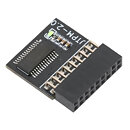TheLostSwede
News Editor
- Joined
- Nov 11, 2004
- Messages
- 18,371 (2.46/day)
- Location
- Sweden
| System Name | Overlord Mk MLI |
|---|---|
| Processor | AMD Ryzen 7 7800X3D |
| Motherboard | Gigabyte X670E Aorus Master |
| Cooling | Noctua NH-D15 SE with offsets |
| Memory | 32GB Team T-Create Expert DDR5 6000 MHz @ CL30-34-34-68 |
| Video Card(s) | Gainward GeForce RTX 4080 Phantom GS |
| Storage | 1TB Solidigm P44 Pro, 2 TB Corsair MP600 Pro, 2TB Kingston KC3000 |
| Display(s) | Acer XV272K LVbmiipruzx 4K@160Hz |
| Case | Fractal Design Torrent Compact |
| Audio Device(s) | Corsair Virtuoso SE |
| Power Supply | be quiet! Pure Power 12 M 850 W |
| Mouse | Logitech G502 Lightspeed |
| Keyboard | Corsair K70 Max |
| Software | Windows 10 Pro |
| Benchmark Scores | https://valid.x86.fr/yfsd9w |
A pair of new vulnerabilities has been found in the TPM 2.0 library by cybersecurity company Quarkslab, that has security experts worried, as both of the flaws have potential far reaching implications. The two vulnerabilities go under the CVE identifiers of CVE-2023-1017 and CVE-2023-1018, where the first one allows for out-of-bounds writes, whereas the second one enables out-of-bounds reads, also known as buffer overflow vulnerabilities. This in itself might not sound particularly concerning, but as both can be triggered from user-mode applications, they're a pretty big deal, as it would enable malicious commands to be sent to a TPM 2.0 module, which could in turn enable malicious software to be installed on the device with the TPM 2.0 module.
According to Quarkslab, billions of devices could be affected, as TPM 2.0 authentication modules are used in everything from servers to IoT devices and has been the main hardware-based crypto solution for almost a decade by now. The attacker using the vulnerabilities would have to know what they're doing to be able to take advantage of these two flaws in TPM 2.0, but as it relies on the TPM command interface, there's no easy way to protect against an attack, if someone has gained user access to the system in question. The Trusted Computing Group (TCG) which is in charge of the TPM standard, has already issued an errata which includes instructions on how to address the two vulnerabilities and we're like to see updates from all major hardware vendors as they see fit.

View at TechPowerUp Main Site | Source
According to Quarkslab, billions of devices could be affected, as TPM 2.0 authentication modules are used in everything from servers to IoT devices and has been the main hardware-based crypto solution for almost a decade by now. The attacker using the vulnerabilities would have to know what they're doing to be able to take advantage of these two flaws in TPM 2.0, but as it relies on the TPM command interface, there's no easy way to protect against an attack, if someone has gained user access to the system in question. The Trusted Computing Group (TCG) which is in charge of the TPM standard, has already issued an errata which includes instructions on how to address the two vulnerabilities and we're like to see updates from all major hardware vendors as they see fit.

View at TechPowerUp Main Site | Source









